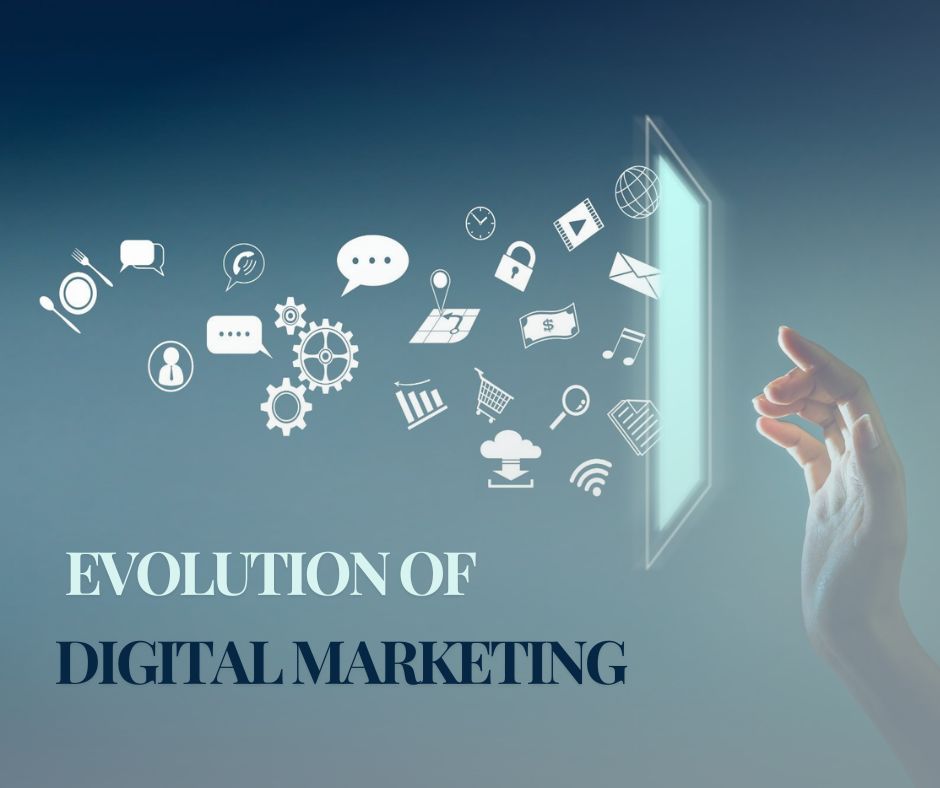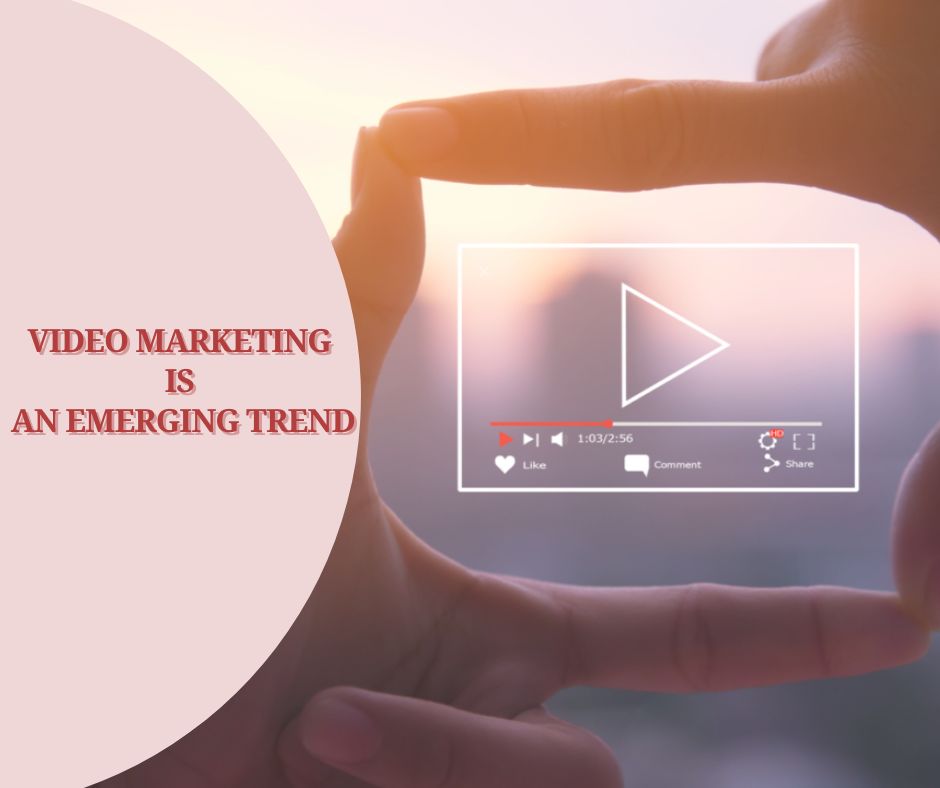Are you studying Mass Communication or majoring in Marketing? Then, you can’t ignore how digital marketing is increasingly becoming the medium of choice for brands that are beginning to realise that they need to keep up with the fast-paced digital world if they want to survive and thrive. The evolution of digital marketing has been rapid, with emerging trends in the field constantly shifting the landscape.
In this blog post, we’ll dive into the changes in digital marketing and explore case studies in digital marketing transformation to illustrate its impact. We’ll also look to the future of digital marketing and see what we need to stay ahead of the curve.
The Evolution of Digital Marketing: From Websites to AI

Digital marketing has undergone a rapid transformation, reshaping how businesses connect with consumers. Let’s delve into the key phases of this evolution:
- Early Days (Late 1990s – Early 2000s):
In the late 1990s and early 2000s, the ‘evolution of digital marketing’ was marked by the rise of websites as vital for businesses’ online presence. The advent of search engines like Google spotlighted the significance of SEO. Concurrently, email marketing burgeoned as a direct conduit to customers, heralding major changes in digital marketing.
- Social Media Boom (Mid-2000s):
The mid-2000s witnessed the explosion of social media platforms like Facebook, Twitter, and Instagram, revolutionising communication and marketing. Brands quickly leveraged these platforms for engagement, content sharing, and community building, marking a shift in digital marketing strategies.
- Mobile Revolution (Late 2000s – Early 2010s):
During the late 2000s to early 2010s, the ‘Mobile Revolution’ necessitated mobile-optimised websites and campaigns. The emerging trends in digital marketing in this era included the rising importance of mobile advertising and apps. Location-based marketing and SMS campaigns gained traction, showcasing pivotal changes in digital marketing.
- Data and Analytics (Ongoing):
In the digital age, data collection and analysis are pivotal for understanding Indian consumer behaviour. Analytics tools now track campaign performance and ROI, enabling data-driven marketing decisions. Case studies in digital marketing transformation prove data’s central role in the future of marketing.
- AI and Automation (Emerging Trends):
Artificial intelligence and machine learning are revolutionising marketing automation. AI-driven personalisation, chatbots, and predictive analytics are already enhancing customer experiences. Voice search optimisation and augmented reality marketing are the next frontiers in this digital transformation.
The future of digital marketing in India is bright, with endless opportunities for innovation and growth. By understanding these changes in digital marketing, students and professionals alike can stay ahead of the curve and craft impactful strategies in this ever-evolving landscape.
Emerging Trends in Digital Marketing: What’s Hot Now

Some of the emerging digital marketing trends you might have already noticed are:
- Video Marketing: YouTube, TikTok, and Instagram Reels dominate ’emerging trends in digital marketing’.
- Voice Search Optimization: Increasingly important to optimise for Google voice searches and Alexa.
- Interactive Content: There’s a surge in interactive quizzes, polls, and videos to boost user engagement and retention.
- AI-Driven Personalisation: Artificial intelligence is enabling hyper-personalised consumer experiences by tailoring content and recommendations in real time.
- Influencer Collaborations: Micro-influencer partnerships are becoming more prevalent, offering authenticity and niche audience targeting.
- Social Media Stories: Brands are leveraging ephemeral story features on platforms like Instagram and Snapchat for daily updates and promotions.
- Programmatic Advertising: Automation in ad buying, using AI to target audiences more specifically, is increasing efficiency and reducing costs.
Case Studies of Digital Marketing Transformation
Some of the case studies of digital marketing transformation that are gems in themselves are:
1. Flipkart’s Big Billion Days
Flipkart revolutionised online shopping in India with its Big Billion Days. This case exemplifies the evolution of digital marketing, leveraging emerging trends such as data analytics and personalised ads to boost sales exponentially. Their strategy highlights significant changes in digital marketing, setting benchmarks for the future.
2. Zomato’s Real-time Reviews
Zomato transformed the dining experience with real-time reviews and geo-targeted advertising. This digital marketing transformation has capitalised on emerging trends like mobile marketing and user-generated content, making it a go-to case study. This shift underlines the dynamic changes and future directions in digital marketing.
3. OYO Rooms’ Expansion Strategy
OYO Rooms’ use of digital platforms to offer affordable lodging disrupted the hospitality industry. By utilising digital marketing strategies that emphasise customer engagement and scalability, OYO showcases the profound changes and emerging trends in digital marketing, which are pivotal in understanding the evolution and future of the sector.
Changes in Digital Marketing: Navigating the Challenges

With the changes in digital marketing, some challenges are cropping up that we need to overcome:
- Privacy Concerns: India’s Personal Data Protection Bill heightens the focus on user consent and data minimisation in marketing.
- Ad-Blocking and Ad Fatigue: Marketers pivot to content-driven strategies to sidestep ad-blockers and reduce user fatigue.
- Keeping Up with Algorithms: Frequent updates demand marketers adapt quickly, staying aligned with new algorithm criteria.
Future of Digital Marketing: A Glimpse Ahead
- Augmented Reality (AR) and Virtual Reality (VR): AR and VR are set to redefine immersive marketing experiences. Brands can create engaging, lifelike interactions, showcasing the evolution of digital marketing through highly interactive simulations.
- The Metaverse: The metaverse promises a revolutionary change in digital marketing, offering a new realm where brands and consumers can interact in dynamic, virtual spaces. This is a key emerging trend in digital marketing.
- Sustainability and Social Impact: The future of digital marketing will strongly focus on sustainability and social responsibility. Brands that integrate these values into their campaigns will likely resonate more deeply with consumers, reflecting significant changes in digital marketing.
Conclusion
Each of these areas represents a dynamic shift, and for students studying media, mass communication, and marketing, these are crucial emerging trends and case studies of digital marketing transformation to observe and learn from.

